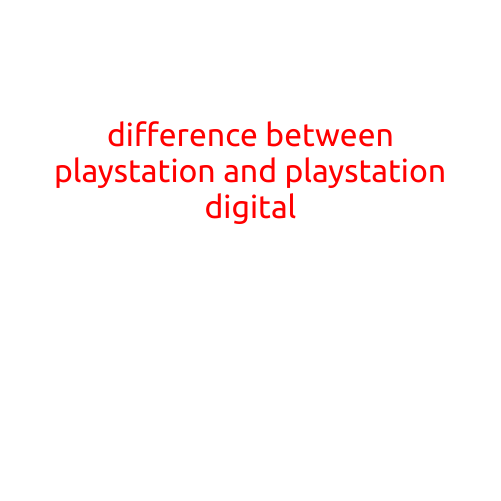
The Difference Between PlayStation and PlayStation Digital: What You Need to Know
The gaming world is filled with numerous options, and for PlayStation enthusiasts, the decision between a traditional PlayStation console and a PlayStation Digital console can be a daunting one. In this article, we will delve into the differences between the two, highlighting the pros and cons of each option to help you make an informed decision.
What is PlayStation?
PlayStation is a traditional gaming console developed by Sony Interactive Entertainment, designed for physical game retail and local gameplay experiences. The latest version of the console, the PlayStation 5, offers a range of features, including 8K graphics, ray tracing, and enhanced controller configurations. Users can purchase physical games in stores or online and play them on the console, allowing for a tactile gaming experience.
What is PlayStation Digital?
PlayStation Digital, also known as PSN (PlayStation Network), is a digital distribution platform developed by Sony Interactive Entertainment. This service allows users to purchase and download games directly to their consoles or PC, eliminating the need for physical copies. PlayStation Digital consoles, such as the PlayStation 5 and PlayStation 4, can be connected to the internet and use the PSN service to access a vast library of digital games.
Key Differences
- Game Availability: PlayStation Digital offers a vast library of digital games, often with sales and discounts, whereas PlayStation physical games are limited to the titles available in stores or through online retailers.
- Game Storage: PlayStation Digital consoles can store games on the console’s internal storage or external hard drives, freeing up space and allowing for a more organized library. Physical PlayStation games require storage on external consoles or separate storage devices.
- Game Updates: PlayStation Digital games receive updates and patches automatically, ensuring users have the latest versions of their games. Physical games require manual updates or special edition releases.
- Local Multiplayer: PlayStation physical games can be played locally with friends and family, without the need for internet connectivity. PlayStation Digital games often require online connectivity for local multiplayer experiences.
- Price: PlayStation Digital games are often priced lower than their physical counterparts, especially during sales and promotions. Physical games may be more expensive due to packaging, shipping, and retailer markup.
- Game Rentals: PlayStation Digital services, like PS Now, allow users to rent games for a set period, whereas physical games must be purchased outright.
Conclusion
In conclusion, the choice between PlayStation and PlayStation Digital ultimately depends on personal preference and gaming habits. If you value the tactile experience of physical games and local multiplayer, a traditional PlayStation console may be the better choice. However, if you prioritize the convenience, space-saving, and cost-effective aspects of digital gaming, PlayStation Digital might be the way to go. By understanding the key differences between the two, you can make an informed decision and enjoy the best gaming experience for your needs.





